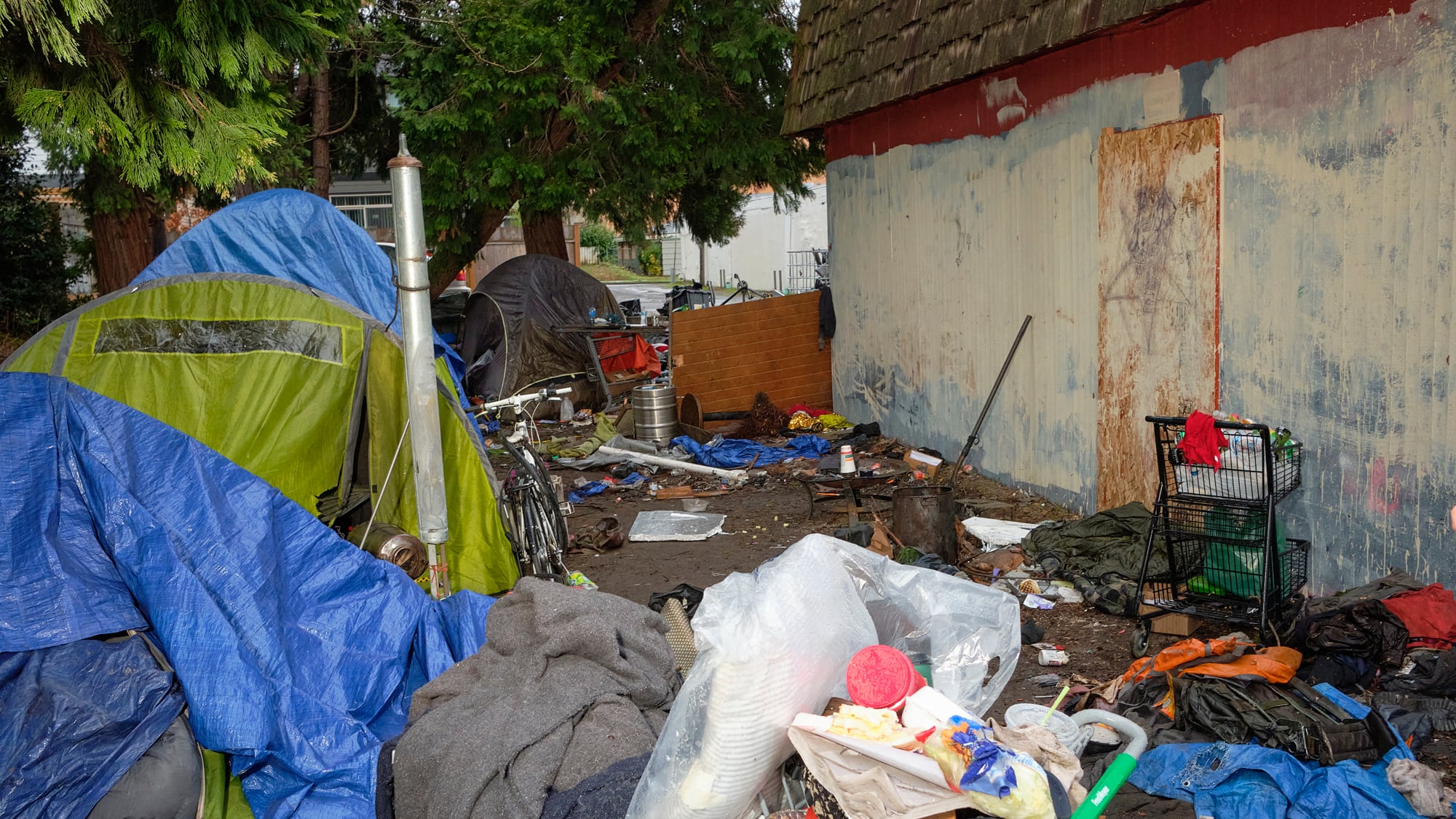“No good deed goes unpunished,” freshman City Commissioner Rene Gonzalez mused at last week’s Portland City Council meeting.
The good deed he was referring to: the Arbor Lodge neighborhood’s YIMBY embrace of a new homeless shelter on North Lombard Street.
The punishment: the eruption of what neighbors characterize as a dangerous and out-of-control homeless encampment in a former dive bar across the street.
Over the weekend, WW visited that encampment, which has expanded from the inside of an abandoned bar to the surrounding alleyway. Neighbors told WW that the fires, guns and brawls emerging from the encampment have left them afraid to leave their homes.
Across the street sits an all-hours homeless shelter, which rather than eliminating nearby encampments only made them worse. The shelter opened in late 2021 after Multnomah County purchased a Rite Aid with $2.6 million in federal COVID aid.
“A lot of the sociopaths showed up right about the time that the shelter opened up,” says Robert Squires, a mail carrier who lives two blocks away. “It was unhinged for the first six months.”
What happened along North Denver Avenue rips the bandage off a delicate question: whether the placement of a homeless shelter leads to unsanctioned camping and criminal activity in the surrounding streets. Arbor Lodge residents say they don’t regret welcoming the shelter—but they wish local government officials would clean up the surrounding blocks.
The encampments block sidewalks and neighbors report “obvious prostitution,” says Ginger Edwards, a member of the Arbor Lodge Neighborhood Association. She remains supportive of the shelter, calling it a “learning experience,” but says more needs to be done about the illegal dumping and the squatters around the bar.
But she acknowledged that simply sweeping people away isn’t enough. “They’ll just be right back,” she says. “I wish that we had more options that were acceptable to people who are camping.”
According to an unsigned draft of a “good neighbor agreement,” dated April 2022, “all participants are committed to maintaining the safety and livability of the area.” Under the agreement, the shelter would “encourage participants to be good neighbors by not trespassing on or through neighborhood property,” but it offers few specifics regarding government agencies’ responsibility.
The Joint Office of Homeless Services, which is run by Multnomah County but jointly funded by the city, is listed as one of the participants—along with the Arbor Lodge Neighborhood Association and the nonprofit that runs the shelter, Do Good Multnomah.
Edwards says the association has yet to sign the agreement “because we want to do more time relationship building” before figuring out how to resolve the issues.
Despite the ongoing problems, the neighborhood remains largely supportive of the shelter, Edwards says. “It’s just the people nearby who have to deal with the issues,” she explains.
The neighborhood association has tried its best to improve relations between the shelter and its neighbors, she says. It hosted Thanksgiving and Christmas dinners. Edwards organized monthly trash cleanups on the surrounding sidewalks, which were attended by neighbors and shelter residents alike.
Now, the Arbor Lodge Shelter is closed for renovations. The county plans to reopen it in 2024 as a “long-term, purpose-built shelter” for 120 people, with “community-led artwork created by local artists,” according to a county website.
Meanwhile, the encampment in the Farmer’s Barn tavern across the street remains—and local leaders have changed their tune, after taking a victory lap at a press conference when the shelter was first opened.
“We are making progress,” Tina Kotek said in 2021. “This shelter is a perfect example of that.” (Kotek represented the shelter’s Oregon House district before being elected governor last year.)
“Portlanders are ready to join me in saying, ‘Yes in my backyard!’” said City Commissioner Dan Ryan at the time.
Now, Ryan seems to be having second thoughts. “I will say that the opening of that shelter was pretty quick,” he told Dusty McCord, vice chair of the neighborhood association, after McCord testified before the City Council last week about the problems surrounding the shelter.
Then Ryan shifted blame. He told McCord to take his concerns to the county. “They do oversee that space,” he told McCord. “Taking your testimony to the county about that specific shelter would be very smart in terms of good government.”
Denis Theriault, a county spokesman, issued a statement to WW pointing out that “camping enforcement, vacant nuisance buildings, and public safety are city responsibilities.
“The unaddressed nuisance building across the street was challenging for shelter operations when folks were there, it remains challenging for the community now, and if it’s not addressed it will be challenging when the renovated shelter reopens, too,” the statement concludes.
Commissioner Gonzalez, who had just taken office after being elected last year, was willing to accept responsibility.
“Collectively, we’ve got to do better at protecting neighborhoods that are supportive of these types of shelters,” he said.

